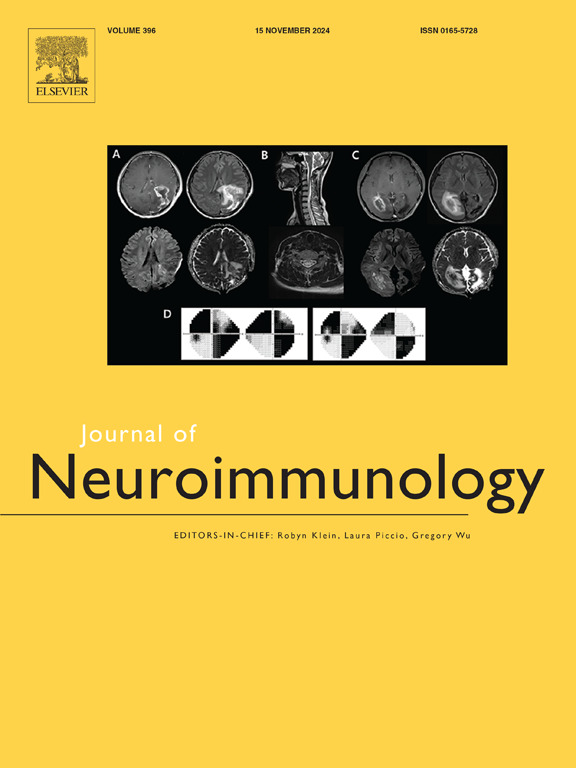SPI1通过转录调节FOSL2表达影响a β1 - 42诱导的小胶质细胞介导的神经炎症
IF 2.5
4区 医学
Q3 IMMUNOLOGY
引用次数: 0
摘要
背景:小胶质细胞诱导的神经炎症有助于阿尔茨海默病(AD)的进展。SPI1与神经炎症和神经元功能有关,并参与AD的进展。然而,SPI1在小胶质细胞诱导的神经炎症中的潜在机制尚不清楚。方法采用ELISA法检测细胞上清中炎症因子水平。倒置显微镜下观察细胞形态。采用western blot、RT-qPCR和IF法检测基因和蛋白表达水平。通过双荧光素酶实验和ChIP验证了SPI1与FOSL2启动子之间的相互作用。结果成功建立AD sa细胞模型,炎症因子升高,细胞形态改变。此外,a - β1 - 42诱导BV2细胞中SPI1和FOSL2表达升高。此外,SPI1或FOSL2敲低可促进a β1 - 42诱导的BV-2细胞中的M2极化。机制上,SPI1与FOSL2启动子结合,促进其转录活性和FOSL2的表达。正如预期的那样,SPI1敲低通过抑制FOSL2表达和灭活JAK2/STAT3通路,促进了a β1 - 42诱导的BV-2细胞中的M2极化。结论spi1敲低可促进小胶质细胞M2极化,从而通过抑制FOSL2/JAK2/STAT3通路抑制神经炎症,最终缓解AD的进展。本文章由计算机程序翻译,如有差异,请以英文原文为准。
SPI1 affects Aβ1–42-induced microglia-mediated neuroinflammation by transcriptionally regulating FOSL2 expression
Background
Microglia-induced-neuroinflammation contributes to Alzheimer's disease (AD) progression. SPI1 has been implicated in neuroinflammation and neuronal function and participated in AD progression. However, the underlying mechanism of SPI1 in microglia-induced neuroinflammation remains unclear.
Methods
The levels of inflammatory factors in cell supernatant were determined using ELISA. Cellular morphology was observed through an inverted microscope. Gene and protein expression levels were detected using western blot, RT-qPCR and IF assay. The interaction between SPI1 and FOSL2 promoter was verified using dual luciferase experiment and ChIP.
Results
A cell model of AD was successfully established, as evidenced by elevated inflammatory factors and altered cellular morphology. Besides, SPI1 and FOSL2 were elevated in BV2 cells by Aβ1–42 induction. Furthermore, SPI1 knockdown or FOSL2 knockdown promoted M2 polarization in Aβ1–42-induced BV-2 cells. Mechanistically, SPI1 bound to FOSL2 promoter to promote its transcriptional activity and expression of FOSL2. As expected, SPI1 knockdown facilitated M2 polarization in Aβ1–42-induced BV-2 cells by inhibiting FOSL2 expression and inactivating JAK2/STAT3 pathway.
Conclusion
SPI1 knockdown promoted M2 polarization of microglia, thereby suppressing neuroinflammation through suppression of the FOSL2/JAK2/STAT3 pathway, ultimately alleviating AD progression.
求助全文
通过发布文献求助,成功后即可免费获取论文全文。
去求助
来源期刊

Journal of neuroimmunology
医学-免疫学
CiteScore
6.10
自引率
3.00%
发文量
154
审稿时长
37 days
期刊介绍:
The Journal of Neuroimmunology affords a forum for the publication of works applying immunologic methodology to the furtherance of the neurological sciences. Studies on all branches of the neurosciences, particularly fundamental and applied neurobiology, neurology, neuropathology, neurochemistry, neurovirology, neuroendocrinology, neuromuscular research, neuropharmacology and psychology, which involve either immunologic methodology (e.g. immunocytochemistry) or fundamental immunology (e.g. antibody and lymphocyte assays), are considered for publication.
 求助内容:
求助内容: 应助结果提醒方式:
应助结果提醒方式:


